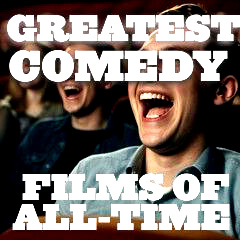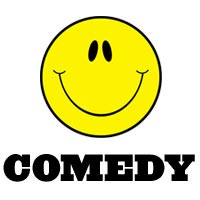
|
The 100 Greatest Comedy Films of All-Time |
|
Comedy Films are "make 'em laugh" films designed to elicit laughter from the audience. Cinematic comedy can be considered the oldest film genre (and one of the most prolific and popular). Comedy was ideal for the early silent films, as it was dependent on visual action and physical humor rather than sound. Comedies are light-hearted dramas, crafted to amuse, entertain, and provoke enjoyment. The comedy genre humorously exaggerates the situation, the language, action, and characters. Comedies observe the deficiencies, foibles, and frustrations of life, providing merriment and a momentary escape from day-to-day life. They usually have happy endings, although the humor may have a serious or pessimistic side. Types of Comedies: Comedies usually come with well-timed gags, jokes, or sketches, or as situation-comedies that are told within a narrative. Both comedy elements may appear together and/or overlap. Comedy hybrids commonly exist with other major genres, such as musical-comedy, horror-comedy, and comedy-thriller. Comedies have also been classified in various subgenres, such as romantic comedy, crime/caper comedy, sports comedy, teen or coming-of-age comedy, social-class comedy, military comedy, fish-out-of-water comedy, and gross-out comedy. There are also many different kinds, types, or forms of comedy, including slapstick, deadpan humor, verbal comedy, screwball, dark (or black) comedy, and spoofs or parody (aka satire, lampooning, or farce). Slapstick was predominant in the earliest silent films, since they didn't need sound to be effective, and they were popular with non-English speaking audiences in metropolitan areas. The term slapstick was taken from the wooden sticks that clowns slapped together to promote audience applause. Slapstick was primitive and universal comedy with broad, aggressive, physical, and visual action, including harmless or painless cruelty and violence, horseplay, and often vulgar sight gags (e.g., a custard pie in the face, collapsing houses, a fall in the ocean, a loss of trousers or skirts, runaway crashing cars, people chases, etc). Slapstick often required exquisite timing and well-honed performance skills. Deadpan humor was best exemplified by the expression-less face of stoic comic hero Buster Keaton. Verbal Comedy was classically typified by the cruel verbal wit of W.C. Fields, the sexual innuendo of Mae West, or the verbal absurdity of dialogues in the Marx Brothers films, or later by the self-effacing, thoughtful humor of Woody Allen's literate comedies, and many others. Screwball Comedies, a sub-genre of romantic comedy films, were predominant from the mid-1930s to the mid-1940s. The word 'screwball' denoted lunacy, craziness, eccentricity, ridiculousness, and erratic behavior. These films combined farce, slapstick, and the witty dialogue of more sophisticated films. In general, they were light-hearted, frothy, often sophisticated, romantic stories, commonly focusing on a battle of the sexes in which both co-protagonists try to outwit or outmaneuver each other, and they have made somewhat of a come-back. Parodies or Spoofs are specific types of comedy (also called put-ons, send-ups, charades, farces, lampoons, take-offs, jests, mockumentaries, etc.) that are usually a humorous or anarchic take-off that ridicules, impersonates, punctures, scoffs at, and/or imitates (mimics) the style, conventions, formulas, characters (by caricature), or motifs of a serious work, film, performer, or genre. In many comedies, there can be considerable overlap with the category of 'farce', since the term has now been broadened and extended (from the early part of the 20th Century) beyond its origins and roots in silent film (and early talkies) comedy. Now, farces - and farcical elements in films, may include fairly outrageous plots, unlikely and absurd circumstances, frantic-paced action, mistaken identities, a major transgression or hidden secret (i.e., often an extra-marital infidelity) sometimes based upon a misunderstanding, and lots of verbal humor, absurdities and physical slapstick, often with a concluding chase scene of some kind. Recently, farces have widened their scope by deliberately and satirically mocking established genres and standard filmic conventions themselves. Dark or black comedy refers to sarcastic, humorous, or sardonic stories that help us to examine otherwise ignored darker serious, pessimistic subjects such as war, death, or illness. More About Comedy Films:
|
 Introduction to the Comedy Films Genre |

|
The 100 Greatest Comedy Films of All-Time |